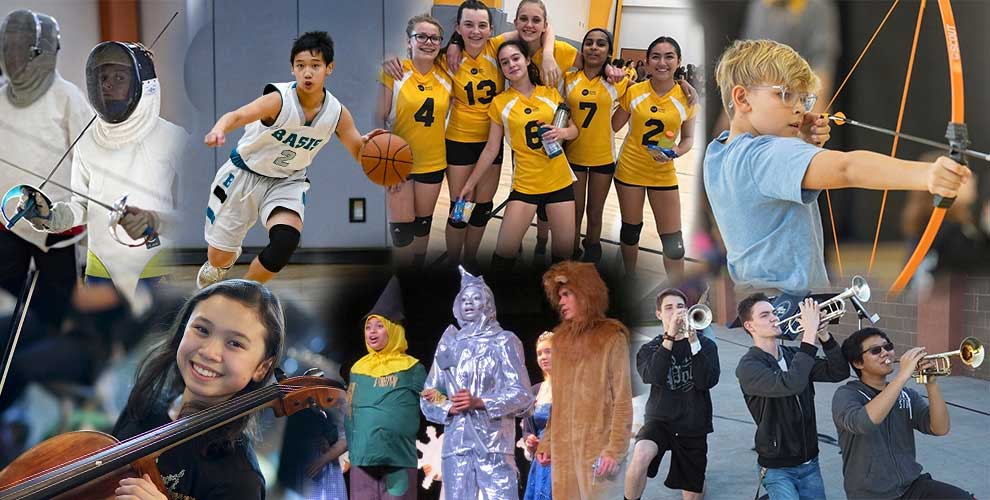Extracurriculars are activities that students participate in outside of their day-to-day academic education. These activities are often school-sponsored and include things like student clubs and sports.
The range of extracurriculars offered at K–12 schools nowadays may surprise you. Here are just a few of the extracurriculars offered at BASIS Charter Schools (please note that activities vary by campus and from year to year):
- Astronomy Club
- Basketball
- Coding Club
- Chinese Calligraphy Club
- Drawing/Cartooning Club
- Jewelry Making Club
- National Honor Society
- Parkour and Tumbling Club
- Red Cross Club
- Tennis
- Yoga Club
Extracurriculars are more than just a fun way for your child to pass the time during lunch or after school—they have several far-reaching benefits for students.
Why are extracurricular activities important?
Extracurricular activities supplement your child’s education, providing opportunities for socialization and enrichment beyond the classroom. Here are a few of the top reasons why extracurriculars are important to K–12 students.
They encourage your child to explore new interests
Extracurriculars give students the opportunity to explore a wide range of interests. They can introduce your child to new people and new perspectives, helping them expand their worldview.
Through extracurriculars, your child could discover a passion they never knew they had. This can get them thinking about what they might like to study in college or pursue as a career later in life.
They help your child make friends
The social aspect of extracurricular activities shouldn’t be overlooked. Extracurriculars are a great way for your child to get to know students they don’t share classes with. This can be especially beneficial if your child has just transferred to a new school or is having difficulty making friends.
They get your child excited about going to school
If your child finds an extracurricular activity they feel passionately about, chances are they’ll find themselves looking forward to going to school each day.
Students who participate in extracurriculars are more likely to have a positive perception of their school, which in turn can lead to better academic performance. In 2019, a study in the Excellence in Education Journal found that 56.9% of students participating in extracurriculars had a positive opinion of their school, compared to only 37.5% of students not participating in extracurriculars. The study also found that students participating in extracurriculars had higher average GPAs.
They teach your child real-world skills
Extracurriculars naturally help your child learn important soft skills such as teamwork, goal setting, and time management. Competitive activities like sports or academic decathlon can also build a strong work ethic and teach your child how to learn and grow from failures.
Additionally, you may find that your child’s confidence improves after they join a club or a sports team. When your child excels at an extracurricular activity, this can give them the push they need to become more confident in other aspects of life.
They bolster your child’s resume and college applications
For teenagers with little to no formal work experience, extracurriculars are vital for rounding out a resume and conveying qualities such as perseverance, reliability, and leadership to potential employers.
The same is true for college applications. Admission decisions aren’t just based on your student’s academic achievements—admissions teams want to know what your child is passionate about and what led them to apply for that particular school. Your child’s extracurricular history can help them craft a compelling narrative that connects back to their choice of school and major.
How to help your child balance extracurriculars with coursework
In some cases, students may have trouble balancing their extracurriculars with their day-to-day schoolwork. As a parent, here are a few things you can do to help your child succeed at both academics and extracurriculars:
- Follow a consistent schedule. Come up with a plan for how the extracurricular will fit into you and your child’s weekly routine. What days will your child participate? If the activity takes place after school or on the weekends, what time will you pick them up? Once you get into a rhythm, stick with it!
- Limit distractions during study time. If your child is participating in multiple extracurriculars, they might not have as much time to study as they did before. In the evenings, ensure that your child has a quiet room at home where they can focus on their homework without distractions from family members.
- Let your child choose their own extracurriculars. Signing your child up for activities you’ll think they’ll enjoy may sound harmless, but these activities can quickly pile up. Letting your child chart their own extracurricular path can keep them engaged and prevent them from getting overwhelmed.
- Remind them that coursework should come first. If your student’s grades begin to slip, you may want to temporarily pump the brakes on any extracurricular activities. Many schools actually use strong academic standing as a prerequisite for participating in extracurriculars. This can serve as motivation for students to keep their grades up.
Help your child find their passion
If your child isn’t currently participating in any extracurriculars, take some time to research the available activities offered at your child’s school. If you find something that seems like a good fit, sit down with your child and encourage them to get involved. Remember, though, you don’t want to force them! Let them know that there is no pressure and that they can always pull out of the activity if it becomes too much.
At BASIS Charter Schools, we align our extracurricular activities to serve our students’ interests. Every campus—including our primary schools—offers a wide range of clubs, sports, and other activities. We update each campus’ extracurricular offerings every year, so we can ensure that our activities resonate with students.
To learn more, find a school near you and schedule a tour.






